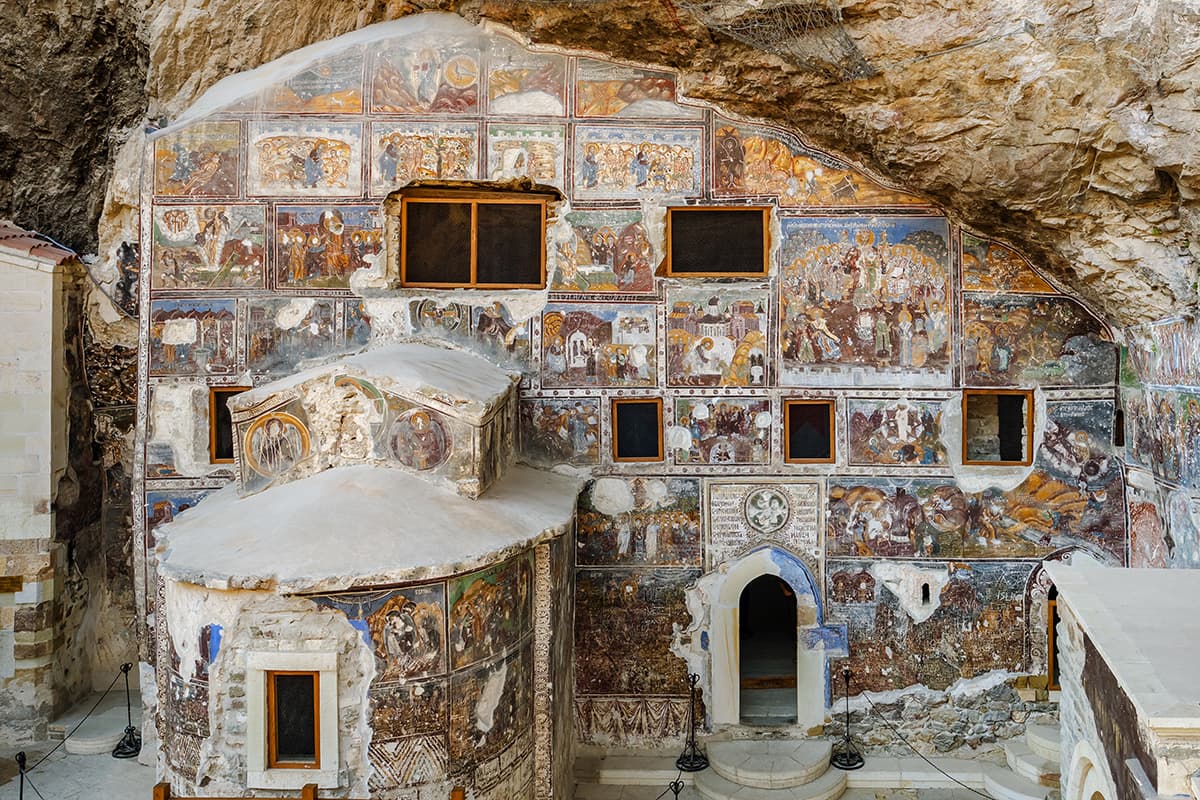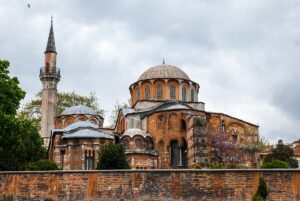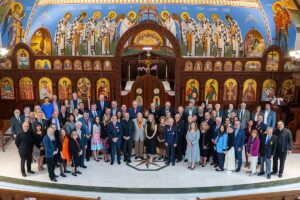The Turkish government on July 20, 2023 denied access to the Ecumenical Patriarchate and Orthodox worshippers to celebrate an important Orthodox Christian Feast Day service at the historic Panagia Sumela Monastery in the Trabzon (Trapezounda) region of Turkey on August 15, 2023. This decision has elicited widespread concern and disappointment not only among the Greek Orthodox community, but also among advocates of religious freedom and of the preservation of cultural heritage.
The Ecumenical Patriarchate, based in Istanbul (Constantinople), holds immense significance for the Orthodox Christian Church worldwide. As the Sacred See of Saint Andrew the Apostle, it serves as the spiritual headquarters of 350 million Orthodox Christians around the globe.
The historic monastery was established around 386 AD and remains a cherished sacred site for Orthodox Christians, deeply intertwined with the rich history and cultural heritage of the Greek Orthodox community. The monastery is currently a candidate with UNESCO for designation as a World Heritage Site.
In 2010, 88 years after the establishment of modern-day Turkey in 1922, Turkish authorities granted the Ecumenical Patriarchate permission to celebrate services at the monastery on its Feast Day, August 15. The August 15 celebration holds special significance for all Orthodox Christians, as it commemorates the Dormition of the Theotokos, that is, the falling asleep of the Virgin Mary. This is a highly revered and cherished event for Orthodox Christians, and the service at the monastery attracted thousands of faithful believers from around the world, coming together to honor God, His Holy Mother, and their sacred religious traditions, as well as to pay homage to their ancestors and their history.
Since that permission was first granted, with the notable exception of a five-year period during which restoration work was undertaken at the monastery, it was renewed annually for the celebration of the Feast Day, and thousands of pilgrims took part in those celebrations. This year is the first time since the reopening of the monastery that Turkish authorities denied permission to hold services there.
The Turkish government’s decision to deny access to this historic monastery to the Ecumenical Patriarchate and the Greek Orthodox faithful is a matter of grave concern. While the official reasons for this denial have not been explicitly stated, it is widely believed to be part of a broader pattern of restrictions and challenges that the Turkish government has set for years in its treatment of religious minorities in the country. The Ecumenical Patriarchate has faced numerous obstacles, including limitations on property rights, restrictions on the election of Church officials, and difficulties in training clergy. These challenges have often been perceived as attempts to undermine the Ecumenical Patriarchate’s authority and reduce its influence, both within Turkey and around the world.
The denial of access to the historic Panagia Sumela monastery for this year’s August 15 Feast Day celebration carries significant implications for both the Greek Orthodox community and the broader principles of religious freedom and the preservation of cultural heritage.
1. Disregard for religious freedom: Denying access to a sacred site of a religious minority for the celebration of one of its most important religious services undermines the fundamental right to freedom of religion. It restricts the ability of the faithful to practice their faith and commemorate important religious events.
2. Preservation of cultural heritage: The historic Panagia Sumela monastery is not only a place of worship, but also a valuable cultural heritage site. Denial of access impedes the preservation and restoration of this important historical and architectural treasure, which holds significant cultural and historical value.
3. Strained relations: The decision further strains the already delicate relationship between the Greek Orthodox community in Turkey and the Turkish government. It perpetuates a climate of mistrust and hampers efforts to foster dialogue and understanding between different religious and cultural communities.
For these reasons, the Turkish decision to deny access to the Ecumenical Patriarchate and the Greek Orthodox faithful to celebrate services at the historic monastery of Panagia Sumela on August 15 is incalculably disappointing. It represents yet another setback for religious freedom and the preservation of the cultural heritage of Turkey, the Christians of Asia Minor, and the Greek Orthodox community worldwide. Advocates of religious freedom and the preservation of cultural heritage must continue to raise their voices, urging the Turkish government to reconsider its decision and embrace a more inclusive and respectful approach towards religious minorities and their sacred sites.







